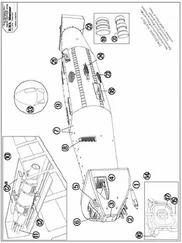There was no doubt in any of his listeners' minds what operation he was speaking about. Task Force Four had no direct involvement in it—for which all of them were privately grateful—but they'd been briefed on "Operation Ferret". . . and about its objectives, given its implications for the MSDF's future operations.
"I don't think anyone's really happy about the notion of relying on Luff and his collection of paranoiacs, Sir," Commander Niklas Hasselberg said now. Trajan looked at his fair-haired chief of staff, and Hasselberg shrugged. "Sometimes deniability comes at a price in reliability, Sir."
"I realize that, Niklas," Trajan said. "In this particular instance, though, I'm not really convinced deniability is an important enough reason to rely on them. For that matter, I'm not really convinced the operation itself is a wonderful idea—or even necessary, at this point. Especially when we've gone to so much effort to keep this end of the bridge so completely black for so long."
"My understanding is that the decision was made at the highest levels, Sir," Commander Ildikó Nyborg, Trajan's operations officer, pointed out in a diplomatic tone, and Trajan snorted yet again, this time harshly.
"It was certainly that," he agreed.
All three of his subordinates understood. Although Hasselberg was the only other person present who knew the identity of the actual individual behind that decision, all of them represented star-line genomes. Star-lines were a minority in the MSDF's officer corps as a whole, of course, but they were heavily concentrated in the more senior ranks, and for duties as sensitive as their own current assignment there'd been some judicious personnel shuffling. As a result of which, Task Force Four's command structure was undeniably top-heavy in alpha-lines, beta-lines, and gamma-lines.
Which meant that, unlike the majority of their fellow officers, they knew the Mannerheim System-Defense Force was actually an adjunct of the Mesan Alignment Navy no one else knew even existed. So the term "higher up" had a very different meaning for them than it would have had for any of those non-Mesan officers.
"I'm not saying the Verdant Vista terminus isn't important, because it is," Trajan continued. "And I realize that using obvious Manpower proxies is about as deniable as it gets, given who's in charge of the system these days. From that perspective, I don't have any qualms about Ferret. The problem is that I think the operation itself is unnecessary. Worse, it's a complication we don't need. We could put a force through the bridge any time we wanted to that would be more than big enough to overwhelm anything the 'Kingdom of Torch' could possibly put in our way. We don't really have to take the system to exercise effective control of the terminus, and if it were my call, we'd go ahead and wait until we actually needed to use the thing. In which case we wouldn't have to rely on Luff's rejects at all."
There was silence for a moment. Osiris Trajan had a well-deserved reputation for openness with subordinates he trusted. "Everybody knows everything" about any current operation, at least at the level of his own staff, was practically a mantra of his, because he regarded it as the only way to get their best thoughts—and prevent competent people from making ignorance-based mistakes. But his comments about the operation against Torch were unusually blunt, even for him, given the fact that TF 4 wasn't even assigned to the MSDF covering force on the other end of the Verdant Vista wormhole bridge.
Captain Granger cocked her head to one side, clearly considering what he'd said. She stayed that way for two or three seconds, then shrugged.
"From a purely military perspective, I agree with you completely, Sir. And I suppose it's always possible someone somewhere's gotten her nose out of joint over what happened in Verdant Vista when we lost control of the system in the first place. I think, though, that the operative factor here, in many ways, is a concern about what the Manties may eventually figure out about the wormhole bridge."
"They aren't going to figure out anything about it that's going to do them any good, Addie," Trajan countered. "Besides, they've already figured out just about anything that could be deduced from their end, or they never would have gotten their survey ship through to SGC-902 in the first place. For all the good that did them."
He grimaced, and so did Granger and Nyborg. Hasselberg, on the other hand, only shrugged.
"I admit that was . . . unpleasant, Sir," the chief of staff said. "It was clearly within policy and Commodore Ganneau's instructions, though."
"I'm fully aware of both those points, Niklas." Trajan's voice was considerably frostier than normally came Hasselberg's direction. "I'm also aware, however, that it was a single cruiser—and one that was the next best thing to totally obsolescent, at that—and Ganneau had an entire battlecruiser squadron sitting there, with two of them already at action stations and knowing exactly where anything from the other end had to come out. Do you really think a Manty skipper would have been stupid enough to fight with eight battlecruisers sitting there ready to turn his ship into plasma? Ganneau had the option of ordering him to surrender; he just refused to take it."
"I'm not defending his decision, Sir," Hasselberg pointed out. "I'm saying what he did was covered. And it probably wouldn't hurt to remember who his sister-in-law is."
Trajan frowned at the reminder. It was just like Hasselberg to bring it up, though, he reflected. The man was as tough-minded—not to say ornery—as they came. And he definitely believed in calling a spade a shovel, even if it wasn't very diplomatic to remind his admiral that Commodore Jérôme Ganneau's wife, Assuntina, was the youngest sister of Fleet Admiral Chiara Otis, the Mannerheim System-Defense Force's chief of naval operations.
Diplomatic or not, it was also an indication of just how much Hasselberg trusted the other officers seated around the table. It was highly unlikely that his observation would have evoked any anger from Fleet Admiral Otis, but that wasn't really the point.
"He may be Admiral Otis' brother-in-law," Captain Granger said, "but that's not who's watching his ass for him, Niklas."
"Of course not, Ma'am," Hasselberg agreed. "But Admiral Kafkaloudes is. And, unfortunately, that's almost the same thing."
"I think we should probably turn this conversation in another direction," Trajan said calmly. The others looked at him, and he shrugged. "Oh, I don't disagree with anything that's been said. On the other hand, there's not much point in discussing something everyone already agrees about, and discussing the CNO's and her chief of staff's—or her chief of staff's, at least—little . . . foibles"—he smiled quickly at Granger as he used her own earlier terminology—"even among friends is neither productive, diplomatic, wise, nor supportive of good discipline."
Granger looked back at him for a moment, gray-green eyes stubborn. Then she inhaled deeply, nodded, and sat back in her chair, reaching for her wine glass.
The truth, Trajan thought, was that Kafkaloudes' empire building tendencies were well known throughout the MSDF. In fact, they were so well known that Fleet Admiral Otis' willingness to put up with them was widely regarded as her single true weakness. She was smart, competent, experienced, and dedicated to her duty, yet it was impossible for Trajan to believe she was unaware of Kafkaloudes' vendettas against anyone who ever made the mistake of rousing his ire. And it was an ire which roused with remarkable ease.
The problem was that, personality shortcomings aside, he really was very good at his job. And, to give the devil his due, part of his job clearly was to protect Otis, because in protecting her, he also protected her effectiveness. That was why Granger and Hasselberg were almost certainly correct where Ganneau was concerned. Otis might not protect him just because he was her brother-in-law—in fact, Trajan, who knew the fleet admiral quite well, was pretty damn sure she wouldn't—but she didn't have to. The commodore could rely on Kafkaloudes to quietly suppress any personal criticism of him. After all, it wouldn't do to have that criticism splash on the CNO! Or that, at any rate, was how Kafkaloudes could be counted upon to see things.
Читать дальше












